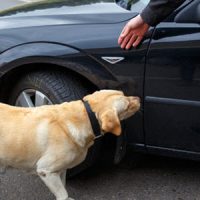Traffic Stops And Police Dogs: What Are Your Rights When A Dog Sniff Leads To An Arrest?

Getting pulled over and stopped by police is a stressful experience – whether it is a routine traffic stop or something more. In all traffic stops, a driver has important legal and Constitutional rights. Generally, you are required to identify yourself when asked and provide proof of identification, insurance coverage, and vehicle registration. However, you are not required to state additional details about where you are traveling, where you are traveling from, or other personal details. A driver has the right to remain silent and is not required to consent to a search of their vehicle.
Whether the officer can still search your vehicle after you’ve refused consent can be a different story, however. The Fourth Amendment of the U.S. Constitution generally protects drivers from warrantless searches by law enforcement officers. There are some exceptions, however – the main one being probable cause. Where probable cause exists to believe that a vehicle contains criminal evidence, officers may search parts of the vehicle where evidence might be found. Arizona v. Gant, 129 S. Ct. 1710 (2009).
Law enforcement can detain a driver for as long as is reasonable to complete a routine traffic stop, Florida courts have held (see Presley v. State, 227 So. 3d 95, 107). This is typically considered the length of time needed to check a driver license, vehicle registration, proof of insurance, and to determine whether there are outstanding warrants, and give warnings or citations. The stop cannot be extended without reasonable suspicion that criminal activity has taken place or is currently taking place.
Controversy has always surrounded the use of police dogs during traffic stops, as a supposed “alert” from a K-9 frequently leads to a spontaneous – and warrantless – search of a vehicle when no other probable cause exists. Law enforcement officers often use trained police dogs to get a “free pass” to inspect a vehicle’s exterior and get information about what is inside. By law, an exterior canine search can happen if it is done within the time required to speak to a driver and issue a citation. (See Nulph v. State, 838 So. 2d 1244.) A canine search that takes place after the time needed to complete a routine stop may violate a driver’s Fourth Amendment rights, however. This could make any evidence obtained after the dog’s “alert” subject to a Motion to Suppress Evidence, and potentially unravel the prosecution’s case against a Defendant.
Potential Defenses in a “Dog Sniff” Case
In cases where evidence was obtained in a traffic stop as the result of a K-9 vehicle sniff, a skilled criminal defense attorney may take any of the following strategies:
- Evaluate the time between the initial traffic stop and the canine search, and challenge the search if it took place outside of the standard time needed to issue a citation;
- Challenge the training and qualifications of the dog itself. Not all police dogs necessarily meet the requirements to conduct vehicle searches, and if they are not properly certified any evidence the dog obtains might not hold up in court;
- Review the dog’s history to assess the ratio of successful and unsuccessful alerts. This could help determine whether the officer has probable cause to search a vehicle or whether they were acting on a hunch – or the dog’s hunch.
The Orlando Criminal Defense Attorneys at Joshi Law Firm, PA Will Fight for Your Rights in “Dog Sniff” Cases
If you were arrested and charged following a vehicle search led by a K-9 unit, you will need an experienced criminal defense attorney to review the case and make sure your rights were not violated. Our Orlando criminal lawyers at Joshi Law will review the facts of your case, including all elements of the traffic stop itself. It could be that evidence was obtained in violation of your Fourth Amendment rights when police dogs are part of the search. To discuss any questions you may have, contact our legal team by completing our online case questionnaire or calling our office today at 407-661-1109.
Source:
aclu.org/know-your-rights/stopped-by-police

